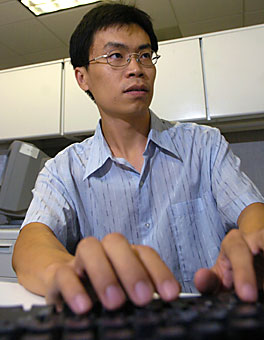 |
|
CHRIS CODUTO/ Arizona Daily Wildcat
|
First-year MIS doctoral candidate Tao Wang works on database coding in the artificial intelligence lab yesterday afternoon. The AI lab helps build faster and more accurate searchable databases.
|
|
|
By Joe Ferguson
Arizona Daily Wildcat
Wednesday, September 15, 2003
Print this
In a small lab in McClelland Hall, about 50 students and researchers work to catch terrorists, cure cancer and build a large-scale academic digital library.
The director of the UA's Artificial Intelligence Lab, Hsinchun Chen, said the goal of the AI Lab is to provide academics and professionals with a better way to get information in their high-tech worlds.
Chen said with the ever-increasing wealth of knowledge available in the digital age, it has become difficult for researchers to stay on top of the most recent developments.
One of the AI Lab's main projects is building academic-specific Internet portals where a collection of links and search engines specific to a confined subject matter would be available to research.
Chen said in addition to creating portals, the AI Lab is helping build vast online digital libraries to help researchers stay abreast their chosen field.
Chen said recent articles in prominent newspapers and magazines about research findings in the AI Lab are proof of the lab's success.
Chen pointed to a 1999 article in the New York Times, which featured COPLINK, an analytical software program jointly developed by the AI Lab and the Tucson Police Department.
COPLINK takes data from various law enforcement databases, based on existing criminal records, and allows law enforcement to coordinate their information using the software.
"It is like Google for cops," said Chen. "But it is much better."
Chen said COPLINK was used to track the Washington, D.C., area snipers. During the height of the sniper probe, two Tucson Police officers went to Washington, D.C., to help federal investigators use the COPLINK software after officials asked TPD for assistance in the case.
In addition to TPD, Chen said law enforcement in Phoenix, Los Angeles, Boston, San Diego and Alaska use the COPLINK software.
Catherine Larson, associate director of the AI Lab, said the lab is also active in the war on terror by helping the Department of Homeland Security identify terrorists.
By working closely with available data, the AI Lab identifies patterns with the data to discover the true identities of criminals using aliases, Larson said.
"We are helping them (law enforcement) discover concealed criminal identities," said Larson.
Larson said the AI Lab cooperates in similar program with authorities focused on border security.
Chen said the AI Lab also works closely with the University Medical Center's Cancer Center in informatics, a field that analyzes exiting medical data to find patterns that could help researchers at the Cancer Center find new ways to treat cancer.
Larson said the fruits of the AI Lab's labor should not be confined to a select few. She said everyone is inundated with massive quantities of information, and it is nearly impossible to digest all the information using current conventional means.
"Helping people deal with information overload is our main goal," Larson said.
According to Chen, the AI Lab is entirely federally funded. The National Science Foundation funds 90 percent of the lab's $2 million budget. Smaller grants from the National Institute of Health, the Central Intelligence Agency and the Department of Homeland Security pay the remainder of the budget.
